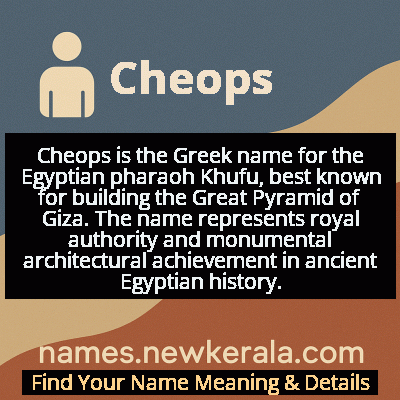Cheops Name Meaning & Details
Origin, Popularity, Numerology Analysis & Name Meaning of Cheops
Discover the origin, meaning, and cultural significance of the name CHEOPS. Delve into its historical roots and explore the lasting impact it has had on communities and traditions.
Name
Cheops
Gender
Male
Origin
Egyptian
Lucky Number
3
Meaning of the Name - Cheops
Cheops is the Greek name for the Egyptian pharaoh Khufu, best known for building the Great Pyramid of Giza. The name represents royal authority and monumental architectural achievement in ancient Egyptian history.
Cheops - Complete Numerology Analysis
Your Numerology Number
Based on Pythagorean Numerology System
Ruling Planet
Jupiter
Positive Nature
Optimistic, inspirational, and creative.
Negative Traits
Scattered, exaggerating.
Lucky Colours
Yellow, gold, purple.
Lucky Days
Thursday.
Lucky Stones
Yellow sapphire.
Harmony Numbers
1, 2, 9.
Best Suited Professions
Arts, writing, communication.
What People Like About You
Creativity, optimism.
Famous People Named Cheops
Cheops
Ancient Egyptian Pharaoh
Built the Great Pyramid of Giza, largest Egyptian pyramid
Khufu (Cheops)
Fourth Dynasty Ruler
Established extensive trade networks and centralized government
Name Variations & International Equivalents
Click on blue names to explore their detailed meanings. Gray names with will be available soon.
Cultural & Historical Significance
In Egyptian culture, Cheops symbolizes the peak of Old Kingdom power and the divine authority of pharaohs. His reign marked a period of centralized government and massive state-sponsored projects that required extraordinary organizational skills. While ancient Greek historians like Herodotus portrayed him as a tyrannical ruler, Egyptian sources suggest he maintained the traditional religious and administrative structures that characterized the pyramid age. The name Cheops continues to evoke images of ancient mystery, royal authority, and human ambition on a colossal scale.
Extended Personality Analysis
Individuals associated with the name Cheops are typically perceived as ambitious visionaries with exceptional leadership qualities and strategic thinking. They demonstrate remarkable organizational skills and the ability to coordinate complex projects, much like the pharaoh who orchestrated the construction of the Great Pyramid. These individuals often possess a strong sense of legacy and long-term planning, thinking in terms of generations rather than immediate results.
Their personality often combines practical intelligence with grand aspirations, making them natural leaders who can inspire others to achieve seemingly impossible goals. While they may be perceived as demanding or perfectionistic, this stems from their commitment to excellence and enduring quality. They value structure, tradition, and monumental achievement, often leaving a lasting impact on their communities or fields of work through their determined pursuit of significant accomplishments.
Modern Usage & Popularity
In contemporary times, Cheops is rarely used as a personal given name but maintains significant presence in academic, archaeological, and historical contexts. The name appears frequently in scholarly works, museum exhibitions, and educational materials about ancient Egypt. While not commonly chosen for modern children, it occasionally appears in fictional works or as a symbolic name in various media. Its usage remains primarily confined to historical reference and cultural education rather than personal nomenclature, though it serves as an important cultural touchstone for understanding ancient Egyptian civilization and its enduring legacy in world history.
Symbolic & Spiritual Meanings
Cheops symbolizes monumental achievement, eternal legacy, and human ambition reaching toward the divine. The name evokes images of architectural perfection, mathematical precision, and the intersection of mortal ambition with spiritual beliefs. It represents the ultimate expression of organized human effort and the desire to transcend mortality through lasting monuments. Symbolically, Cheops embodies the concept of building structures that outlast civilizations themselves, serving as a metaphor for any grand, enduring project that requires vision, resources, and generations of dedicated work to achieve immortality through earthly accomplishments.

